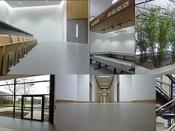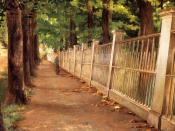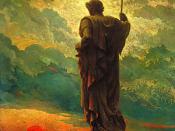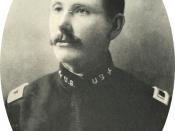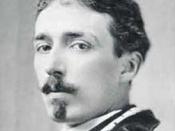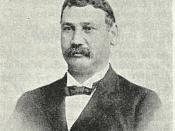James Carroll opens up his book reflecting upon what takes place in the chapel at Bolling Air Force Base on Saturday, February 23, 1969, His first mass as a priest. The book itself is a personal reflection of his life, his goals, and how his father interacted and opposed his views of the Vietnam War, and life in general.
Caroll, himself grew up the son of a general. He was given special attention where ever he was because, as he found out, Rank, (his Father's) does have its own power. He would spend his time going from the Pentagon in the US, to Going with his father to Germany, and visiting his Father's OWN personal train. "High school kids were forbidden from admission to the Eagle Club...That was less a problem for me than a further condition of my joy in the place." "I learned early in Wiesbaden that such rules did not apply to the General's son" (Carroll, 65)Joseph F.
Carroll, James father was a unique Man. He had quit the seminary just before his ordination as a priest at age 24, right before he was to take his vow of celibacy and then to be ordained, he refused. After this he went to night school and worked in the shipyards. He graduated and then went on to become a lawyer. Later on he would become an FBI agent, working on such things as counter Intel against the Germans and the Japanese. After working for the FBI, in 1947 when the Air Force was created, The Secretary of the AF asked J. Edgar Hoover for help to create an Air Force Investigative Unit. Hoover sent Carroll to create the Air Force Office of Special investigation, or OSI. So at age 37, Joseph Carroll, was commission as a Brigadier General, at the age of 37, making him the Youngest General in the US. He would later become chief of staff of the Air Force in Europe, and then Work for the DIA choosing targets in bombing runs during operation linebacker during Vietnam. " Symington (SECAF) approached Hoover for the loan of an FBI expert in investigations and counterintelligence to devise a structure for an Air Force Security agencyâ¦He assigned to Symington a man he described quite simply , this is my mother speaking, as his very best" ( Carroll 40)The reason that James's family wanted him to go into the priesthood was that since his father was an Irish Catholic, and at the very last minute decline to take his vow of celibacy or to get ordained, he was seen as a spoiled priest, and this was to be looked down upon in the Irish eyes, epically in Chicago at the time. James needed to make up for his families' name since his father had done wrong but not ending up as a priest.
The Kennedy years were seen as something that needed to happen. Here was a young Irish catholic president from Boston, the 1st president to be Roman Catholic. This was seen as a great thing, since the president could bring change and hope to Catholics and the world everywhere. James Carroll became involved in the civil rights movement after viewing documents that Labeled martin Luther King Jr as a degenerate. Carroll could see that the Government was positioning itself to condemn MLK, and his planed marches. My Father, with his steady access to a series of secret Bureau briefings,⦠had gone from calling him a communist to a degenerate" ( Carroll, 153) IN spring of 1968, Carroll was working for a local SCLC and Poor people's campaign in Washington that called for racial and economic justice. Carroll also trusted the movement too, feeling as if he was doing something for the better of man. "And I trusted the movement too" ( Carroll, 154)Carroll became critical of the church when the church itself began "self-segregation" against people who were non Roman Catholic. This would mean the persecution of Jews, Gays and other people in which the church thought unworthy. There was also the mention of the sexual abuse encountered by church goers at the hands of evil priests. After these events James Carroll felt himself going over to the left wing faction of the church. Carroll even goes so far to call out the church for its support in Vietnam, the Americanization of the war, and the church's eagerness to follow this setup. He also lost himself against the church when the church itself called the dropping of napalm justified, but if they were condoms, the church would condemn it. "But instead, they called it justified because the B-52S were only carrying napalm" (Carroll 203)Carroll became critical of the war and lost the support of his father when he believed that War itself was wrong, and the fact that innocent civilians were being killed. To me it seemed that Carroll had the greatest distance for the use of Napalm against the population. And when it came to his Father and his the War, the biggest disagreement always came when it came to the usage of weapons in Vietnam and the possibility of the escalation of the War. Carroll even goes as to talk to his father about the possible use of Nuclear weapons in Hanoi by Gen. Curtis Lemay, and SAC, Strategic Air Command, and the quote " If we are going to Bomb Hanoi, fine, if we are not, it doesn't hurt to have Hanoi think we will." (Carroll, 198)All and all with this book it seems like there is a lot of self-reflection that can be seen in the writers words, especially when it comes to the relationship with his father. James father, Joseph, started down the road of splitting the relationship by first working for the Defense Intel Agency by choosing targets for runs during Operation Rolling thunder during 1968 and then later at Hanscom Air force Base, where His father was a part of a program called, "Igloo White" Carroll thought that this program was in direct reflect to the air war escalation due to the fact that igloo white was an infra-red detection beacon that would signal B-52's in the area to complete an air strike with accurate fire and napalm. This Carroll felt was a complete wrong in the fact that the Catholic Church itself would condone war and the deaths of innocent civilians in Vietnam.
The tragedy of the book and the relationship between father and son is one that shows the apple doesn't fall far from the Tree. Even though Joseph was working to find targets to bomb, he didn't feel it would all work out in the end. James lost faith in the church and the workings of it. It boils down to the inability to bring oneself to continue to do something you know you can't, even if it means false motivation. The war was the reason that Father lost son and vice versa.
Overall the war had destroyed the relationship of Joseph to James as a whole, righteous man, who fell under the church. It also destroyed the James to Joseph, as Joseph could no longer count on James. The relationship itself could have been saved if James had done more to try to get his father to talk. Also James to repair his relationship with his Father could stop the self loathing that is so ever present in the book.
Carroll, James : An American Requim, Boston, Houghton Mifflin Company, 1996
